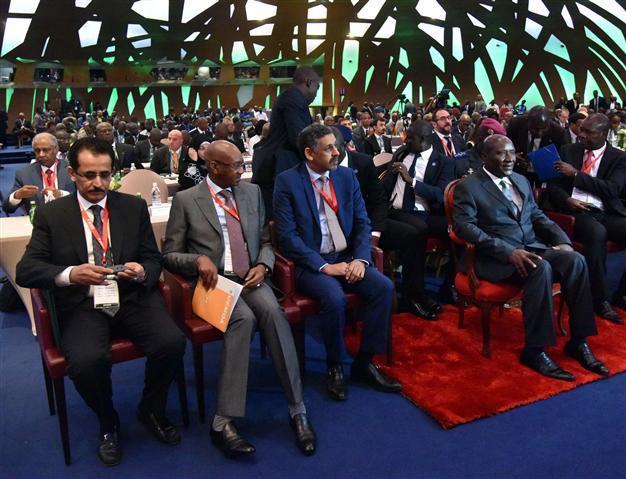Africa looks to Islamic finance
ABIDJAN – Anadolu Agency

Cheikh Hadjibou Soumare (2nd L), president of the West African Economic and monetary union (UEMOA), Khaled Al Aboodi (L), Islamic Corporation for the Development of the Private Sector, Sidi Ould Tah (3rd L), General Director of the Arab Bank for Economic Development in Africa and Ivorian Prime Minister Daniel Kablan Duncan speaks on September 17, 2015 during the Africa Islamic Finance Forum in Abidjan. AFP Photo
Islamic finance, which shuns the use of interest on loans, is relatively rare in West Africa, where over 90 percent of the total population is Muslim. However, experts believe Islamic finance could represent a viable alternative – and help the development of the continent in the process.“Islamic finance is the future. Many African countries, especially in West Africa, want an Islamic financial system,” Mouhamadou Lamine Mbacke, general director of the African Islamic Finance Institute, told Anadolu Agency.
“Islamic finance is moral,” he said. “It’s based on the principles of sharing and is in line with African traditions, including solidarity and mutual assistance.”
Beyond the religious aspect, Islamic finance has been identified by many experts as a way to avoid the risks associated with speculation, which is what led to the 2008 global financial crisis.
Global ratings agency Standard & Poor’s (S&P) said in a recent report that new regulations and fiscal incentives “could accelerate Islamic finance development in Africa, which could help the continent fund its infrastructural needs.”
Aware of the challenges, the African Institute of Islamic Finance has launched several initiatives aimed at developing the Islamic finance sector in Africa.
Since 2010, the institute has organized three forums in Senegal devoted to the subject and has trained nearly 700 Islamic finance experts.
On Sept. 17 and 18, an Islamic finance forum was held in Côte d’Ivoire by the country’s Planning and Development Ministry.
The aim of the forum was to discuss means of promoting Islamic finance – in Côte d’Ivoire in particular and Africa in general – and how to best mobilize the tools needed to do this.
At the forum, Abdallah Mabri Toikeusse, head of the Islamic Development Bank (IDB), said Islamic finance was particularly well-suited for development, “given its low costs and altruistic character.”
He went on to point out that Côte d’Ivoire was about to issue its first sukuk, or Islamic bond, in the amount of 350 billion CFA francs (roughly $700 million) with the support of the IDB.
A sukuk is a certificate that pays a dividend based on a return from a tangible asset. It is similar to a traditional bond in Western finance, with the difference being that a bond bears interest, which is not permitted in Islamic finance.
Ivorian Planning and Development Minister Kablan Duncan said the Islamic finance industry offered “excellent prospects for the African continent, which we should seize.”
According to Duncan, the Ivorian government is working in tandem with the Islamic Corporation for the Development of the Private Sector to develop a program for issuing five-year sukuks.
Madani Tall, former World Bank director of operations in Côte d’Ivoire, told Anadolu Agency that Islamic finance was “a financing alternative and a complement to conventional financing.”
“This,” she said, “is promising for Africa.”
Also attending the Abidjan forum, Khaled al-Aboudi, general director of the Islamic Corporation for the Development of the Private Sector, announced that a subsidiary of the IDB would devote 30 percent of its funding to Africa over the next five years – up from a current 13 percent.
In February, Niger, a country in which 95 percent of the population is Muslim, issued its first sukuk, worth $260 million.
The move came after South Africa and Senegal both issued their first sovereign sukuks in 2014 worth $200 million and $500 million, respectively.
The IDB has 55 members, including 22 African countries, 17 of which are in sub-Saharan Africa.
With a view to bolstering its presence in sub-Saharan Africa, the IDB has established a special $12 billion program that aims to finance various sectors in Africa, including agriculture, energy, transport and education.
















